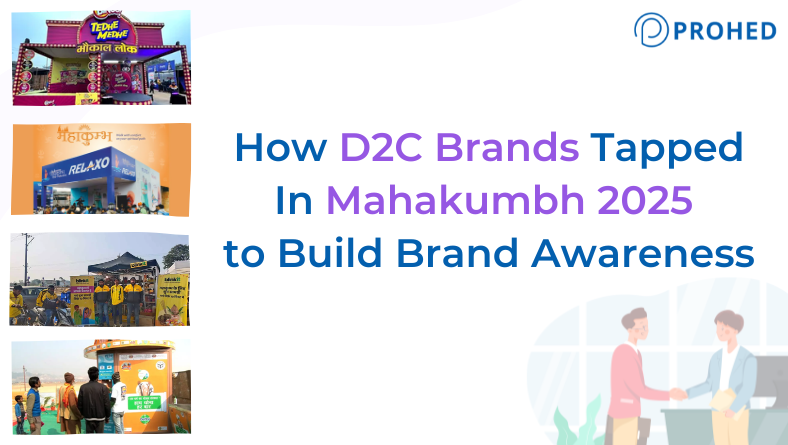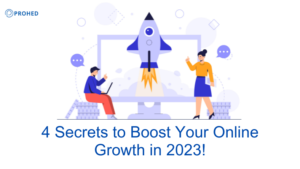This 2025 Mahakumbh Mela is truly exceptional due to the rare alignment between Jupiter, the Sun, and the Moon, which is a powerful astrological occurrence in Hindu tradition. This time, Prayagraj, Uttar Pradesh, is expecting to see around 45 crores of visitors, including domestic, saints, and international tourists.
While the Hinduism tradition plays a crucial role in attracting visitors to Mahakumbh, D2C brands have already started leveraging this massive gathering as one of the best marketing opportunities to connect with diverse audiences and build brand awareness on an extremely large scale.
Presenting brands in front of 45 crores of visitors is like participating on a global stage to showcase products and services to a wider range of audiences, either at no cost or by bearing a minimal cost. Even Blinkit and Nestle have opened up their pop-up stores in Mahakumbh to capitalize on this unique marketing opportunity and engage with millions of potential customers.
As per the Indian government’s estimates, Mahakumbh 2025 will generate around 1.5–2 lakh crore rupees in revenue for businesses participating in the event.
How Are D2C Brands Grabbing New Opportunities in a Spiritual Ecosystem?
D2C brands are seizing this biggest-ever marketing opportunity by presenting themselves in Mahakumbh 2025. This sacred occasion, deeply rooted in spiritual traditions, is offering a well-fertile ground for D2C brands.
Brands are positioning themselves as part of the spiritual system and taking a proactive approach by creating unique and culturally relevant products that resonate with the spiritual audience.
- Airtel: Airtel has enhanced its network connections in Prayagraj for the Maha Kumbh Mela by installing 287 new sites and laying an additional 74 kilometers of fiber.
- ITC Bingo! Tedhe Medhe: At the Maha Kumbh Mela 2025, ITC Tedhe Medhe has started an immersive campaign, “Bhaukaal Lok.” The campaign includes attractions such as a BYOB (Bring Your Own Bingo!), a Chaat Zone, and an Interactive Content Zone for social media participation. The campaign combines Uttar Pradesh’s vivid culture and robust cuisines with the brand’s unique spirit.
- Amul: At the Maha Kumbh, Amul debuted a limited-edition line of dairy products with spiritual undertones. Along with exhibiting the brand’s rich history, they have put up booths to sell a variety of products, including snacks and drinks, that have a local flavor.
- Patanjali Ayurveda: Patanjali is well known for its Ayurvedic remedies, but at Mahakumbh 2025, the company is highlighting its spiritually infused wellness offerings. Patanjali is building stronger relationships with the audience through booths that offer wellness advice, natural products, and spiritual solutions.
- Dabur: To appeal to the spiritual and health-conscious visitors visiting Mahakumbh, Dabur has centered its marketing efforts on wellness and health items. To promote themselves as a company that values physical and mental well-being equally, they are providing free health screenings, samples of their products, and wellness sessions.
- Hindustan Unilever: Hindustan Unilever has set up hygiene awareness booths to engage pilgrims with its personal care and hygiene goods. They are appealing to environmentally conscious and spiritually attuned tourists by advertising their sustainability projects and eco-friendly product ranges.
Innovative Campaigns at Mahakumbh: How Brands Are Standing Out?
In today’s highly competitive market, it’s difficult to stand out among the millions. Brands at Mahakumbh 2025, however, have risen above the crowds with fresh, engaging advertisements that go deep into people’s hearts.
These brands have discovered special ways to make an impression on the large and varied population of pilgrims and tourists by combining innovative thinking with cultural awareness and smart advertising.
- Coca-Cola: A new ad campaign from Coca-Cola is all about “Sharing Happiness at Kumbh.” At the brand’s vibrant and engaging booths, visitors may play cultural activities while sipping on a cool Coke. At the same time, they have a project called “Share a Coke with a Friend” that encourages pilgrims to put their names on cans and share them with others. They form an emotional connection by associating the brand with feelings of happiness and unity on this path of self-discovery.
- Maruti Suzuki: Visitors visiting the Kumbh grounds may now try out Maruti Suzuki’s range of cars, including their environmentally friendly models, thanks to a new and exciting experience developed by the automaker. In addition to promoting environmentally friendly modes of transportation, they have set up driving zones where attendees may test out the conveniences and safety features of their vehicles. A special discount on vehicle purchases is also available to Mela participants as part of this effort.
- Myntra: Myntra has gone digital by creating an immersive experience through augmented reality (AR). Visitors can scan QR codes at Mahakumbh to experience a virtual fashion showcase on their smartphones. Myntra is also running exclusive discounts for visitors, offering a chance to purchase Kumbh-themed apparel and accessories. They designed this digital campaign to appeal to the younger and tech-savvy crowd attending the event.
- HDFC Bank: With an emphasis on digital banking, savings, and investing, HDFC Bank is educating pilgrims as part of a campaign to promote financial literacy. At these kiosks, guests may do things like open bank accounts, get digital loans quickly, and take part in financial education classes. HDFC hopes to improve financial inclusion and foster long-term relationships with underprivileged communities through its participation in Mahakumbh.
- Swiggy: As part of their “Food for the Soul” campaign, Swiggy is providing free, nutritious lunch boxes to anyone attending the Mahakumbh. To help pilgrims feel more energized and healthy, these boxes feature nutritious, locally sourced ingredients. As part of their initiative, they have developed a digital ordering mechanism that allows attendees to conveniently buy food from food trucks located within the Kumbh Mela grounds.
The increasing awareness among brands of the importance of creating meaningful connections with guests at Mahakumbh 2025, while also being mindful of cultural sensitivity, is seen in this creative marketing.
The Shift in Consumer Behavior Post-Mahakumbh, 2025, for D2C Brands
D2C brands are unable to overlook the change in consumer behavior following the spiritually charged and energetic Mahakumbh 2025. It was an immersion into a world of innovation, culture, and conscientious shopping for the millions of visitors—more than just a religious gathering. Brands that promote health, sustainability, and community connection in addition to providing high-quality products are seeing a rise in popularity since Mahakumbh.
Customers nowadays are pickier than in the past. To be successful in today’s market, companies must do more than simply sell items; they must also speak to our emotions, our culture, and our fundamental needs. This was very clear to the direct-to-consumer firms that created waves during the Mahakumbh; they catered to pilgrims’ spiritual needs by providing them with distinctive, locally sourced, and distinctly memorable merchandise. Whether it’s health, sustainability, or community, the product’s meaning to us goes beyond the transaction.
Brands that provided an experience, resonated with our beliefs, and allowed us to feel like we were a part of something bigger than ourselves are more likely to have our support after Mahakumbh. This change will require direct-to-consumer marketers to exert more effort in maintaining that connection with today’s socially conscious consumers.
Takeaways from Mahakumbh 2025
A new era in customer involvement has opened for direct-to-consumer brands following Mahakumbh 2025. They have established a foundation for lasting brand loyalty by connecting with the emotional, spiritual, and cultural experiences of millions of people.
Customers nowadays are looking for more than simply items; they desire experiences, companies that reflect their values, and value-driven services. After the Kumbh, direct-to-consumer businesses that capitalized on this unique opportunity will remain etched in people’s memories.




